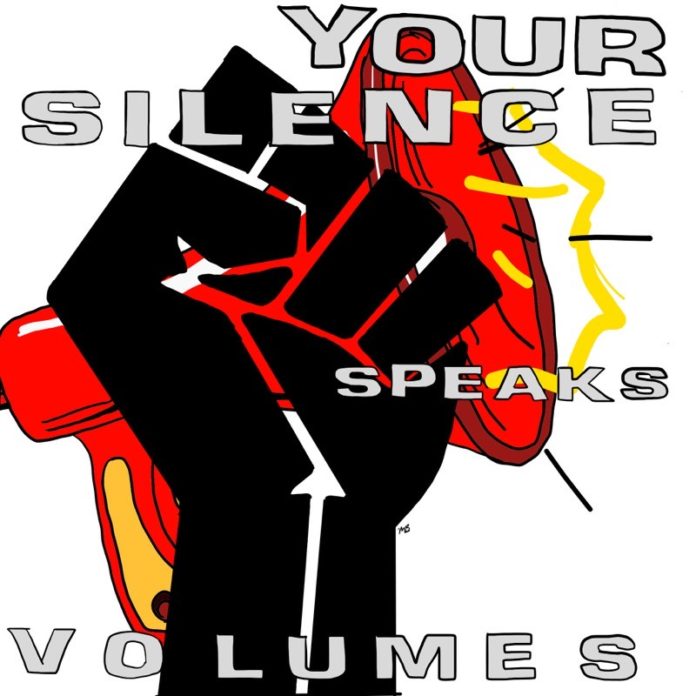Anna Long and Hayden Peters
Senior Mohamed Haji said that seeing the footage of George Floyd’s murder caused him to tear up. “It could have easily been anyone I know or it could have been me too. I think that if it wasn’t filmed, I don’t know what would have happened. After that, my mom bought me and my brother dash cam recorders just so that if anything does happen it would be recorded.”
While the Black Lives Matter movement begins to intensify, many teens are searching for ways to make a difference. There are multiple avenues to show support and advocate for anti-racism.
Many demonstrations of support towards the BLM movement have stemmed from social media such as Twitter, Instagram, and other platforms. Some have found these mediums helpful in contributing to the cause.
Senior Delaina Fletcher said that social media is an easy way to spread information to America’s youth. “If you have a large following or any following at all, posting something about the movement could prompt someone else to want to post something and spread awareness about the topic or even change someone’s entire viewpoint,” Fletcher said.
In efforts to show support for the movement and with the intent to give people a day to be mute online and take steps to educate themselves, the hashtag ‘blackouttuesday’ was developed. Though it started out as something only the music industry was taking part in, the word quickly got around and people of all kind participated in uploading a black box to their feed.
Despite the idea stemming from good intentions, Haji said that he felt as though the concept worked against itself. “I really didn’t like #blackouttuesday because a lot of people just posted the black squares with the caption #blacklivesmatter which is bad because what was once an educational hashtag, is now just drowning in black boxes. It wasn’t a bad idea it was just used improperly,” Haji said.
Senior Dera Okafor has put her social media platform to use by creating a new way to spread her voice, as well as that of other students’ on the matter of racism.
“For the past few months, I’ve been working alongside other teens of Lee’s Summit to create a podcast called I can relate. It is sponsored by LSCares and is streaming on Spotify, Apple Podcasts, and every podcast app. By doing this, I am able to reach a larger audience and allow them to truly hear my voice,” said Okafor.
Okafor said that it is vital for teenagers and younger generations to effectively speak on such controversial issues in the world. Social media is only useful if you utilize it correctly, she said.
According to Haji, now could not be a better time for all of this to happen. “I do think it took too long for all of this to happen, but the atmosphere is perfect right now because COVID-19 is preventing so many things and everything is put on pause and the things that would flood the movement in the news like the NBA or campaign rallies isn’t there,” Haji said, “This means that all the reporters are taking in are the protests and the Black Lives Matter movement.”
Haji said that social media is an important aspect of this movement, however, activism can’t stop there. He said that taking the time to talk to people and get educated is much more vital.
“Try to talk to people who are different from you rather than like-minded people. It can really open your eyes to new perspectives. If you’re not uncomfortable, honestly then you need to get to that point because change really can’t happen in a comfort zone,” Haji said.
Since the murders of George Floyd, Breonna Taylor, and many other Black people, there have been petitions and donation services created in support of their families.
“The easiest way to help is signing petitions. It takes like 5 minutes to sign 10 petitions and every signature or donation counts,” said Samantha Cea, junior.
Because many teenagers may be unemployed due to the pandemic, it could be financially difficult to contribute money to some petitions and organizations. Even without money, a donation to certain causes is possible.
“I personally don’t have money to donate, so I watched a YouTube video with ads that donated to the BLM organization. As for petitions, I’ve signed several from change.org including Justice for George Floyd, Justice for Elijah McClain, banning the use of rubber bullets for crowd control, and Justice for Breonna Taylor. I chose those petitions because they were easily accessible and they’re important causes I believe in,” Cea said.
Donating directly to the BLM movement can directly impact those protesting. “Donating can go towards bail for those who are being arrested just for using their first amendment right. Donating directly correlates to protests,” Haji said.
English teacher Megan Goss said she believes, as a white person, an effective way to support the movement is to read about racial injustice and become educated on the topic.
“One of the first things that is necessary for us to do is learn. Learning about the history of violence against Black people in the U.S. is not the glamorous part of being an advocate. It doesn’t feel good, and it’s not immediately satisfying like going to a protest. But it is a necessary part of being the best advocates we can be,” Goss said, “Learning about these things is necessary for all students, but especially white students who are typically not as educated about Black history or the history of racism in the U.S.”
Senior Quin Engel said that she believes it is crucial to use your voice. “As a white person, it can be tricky to know if I’m voicing my support or if I’m virtue signaling. So, taking action as well as being vocal about my support is important. If you say you support or you’re an ally and then doing nothing to back up your claim, do you really support? Especially when there are so many different ways to take action and there’s not only one way to support the movement, everyone can do something.”
Engel said that supporting this movement is not a ‘trend.’ “Even when it stops getting media attention the support can’t stop.” Engel said. “As white people it’s easy to be angry for a period of time, and then retreat back to the comfort of our homes. While Black people have to experience injustice every day. That’s what I hope is different this time. That people keep showing up.”
Both Engel and Haji remain hopeful, but insist real change will take work. In order for racism to stop being an ongoing occurrence, people need to take action.
“I like to think there will be a time when racism won’t exist but for that to happen everyone needs to stand up and take anti-racist measures,” Haji said. “Racists can’t speak their minds. Racism can’t be excused for dark humor. Racism isn’t cool.”















